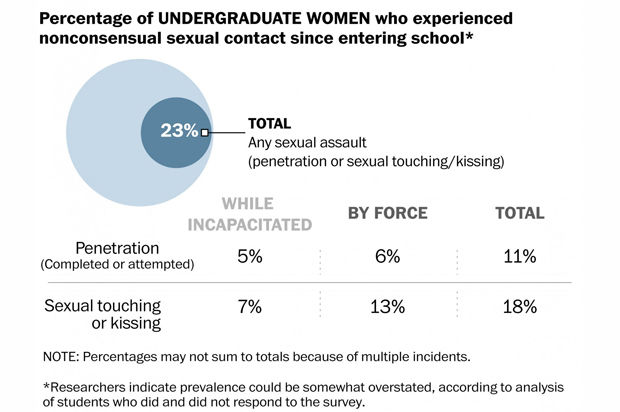AAU study surveys Missouri universities, other colleges on sexual assault
One in five female college undergraduates at top universities experience sexual assaults, according to a report published by the Association of American Universities (AAU) Sept. 21. The finding comes after AAU conducted a survey of 27 universities across the country – including the University of Missouri and Washington University in St. Louis – with 150,000 student respondents.
As the study showed, 23.1 percent of female undergraduates said they were victims of incidences of sexual assault and sexual misconduct due to physical force, threats of physical force, or incapacitation — including 10.8 percent who experienced penetration.
At University of Missouri alone, 27 percent of female undergraduates said they were victims of sexual assault or non-consensual misconduct through force or in situations while they were incapacitated and unable to consent. Among undergraduate men, the rate was six percent.
“Beginning in January of 2014, UM President Tim Wolfe and I put in place numerous new policies, procedures and training programs, created a Title IX office, and hired an administrator and staff,” said Missouri University Chancellor R. Bowen Loftin in a Washington Post article Sept. 21. “All of these investments are aimed at reducing the number of these types of incidents and assuring our students that if they are victims, they know they have a place where they can report incidents and that they will be treated with respect.”
At Washington University in St. Louis, 23 percent of female undergraduates said they were victims of sexual assault or non-consensual misconduct through force or in situations when they were incapacitated and unable to consent, while eight percent of undergraduate men said they were victims.
“The survey data are consistent with other insight we have gained in recent years,” said Washington University Chancellor Mark S. Wrighton. “In many ways they affirm what we already know, and they also underscore the need to ramp up our efforts, particularly in the area of prevention. We have a strong base on which to build through efforts that are underway, which the data show are making a difference in education and awareness.”
Claire McCaskill, the senior U.S. Sen. from Missouri and a former sex crimes prosecutor, also led a national survey of colleges and universities across the country, which focused on how such crimes are reported and investigated and how students are notified about available services. The results of this survey demonstrated a “disturbing failure” by many higher learning institutions to comply with the law and with best practices in how they handle sexual violence against students. McCaskill released the following statement Sept. 22 after the release of AAU’s report:
“This survey further underscores the need for our bipartisan legislation — including climate surveys, which are one of the strongest tools for understanding and helping curb sexual violence. The results should be a wakeup call for all colleges and universities about this widespread, underreported crime on our campuses, and we’ve got to do a better job combating it. I’m pleased that so many schools participated in the survey and are committed to understanding and battling this crime, but we’ve got to continue working to get these surveys on every campus in this country.”
At Missouri Southern State University, seven forcible sex offences – including one reported incident of rape – are known to have occurred on campus in the last three years, according to the Annual Security and Fire Saftey Report released Sept. 30 by University Police Chief Ken Kennedy – but could there have been more incidences?
Also found in AAU’s report, the overall rates of reporting sexual assault to campus officials and law enforcement or others are low, ranging from fi ve percent to 28 percent, depending on the specific type of behavior. The most common reason they found for unreported incidences of sexual assault and sexual misconduct was that it “was not considered serious enough.” Additional reasons included cases where students were “embarrassed,” “ashamed” or felt “it would be too emotionally difficult,” as well as their belief that nothing would be done about it.
To help prevent sexual assaults on campus, Ken Kennedy, University Police Chief, teaches a Rape Aggression Defense course each semester, which is designed for women only and teaches real-life self defense tactics.
In addition to this, UPD also encourages “bystander intervention,” which asks students, faculty and staff to responsibly take action and intervene whenever they witness an incident.
Anyone who finds him or herself the victim of sexual assault is also encouraged to seek out Missouri Southern’s Academic, Counseling and Testing Services (ACTS), which provides counseling services to Missouri Southern students.
“We do provide personal counseling and support,” said Faustina Abrahams, first year advising coordinator with ACTS. “Basically, we help [victims] understand what’s going on, how to manage the anguish and mental health during this time, and — if they want to press charges — how to prepare themselves for … legal battles, and how they can manage themselves.”
Your donation will support the student journalists of Missouri Southern State University. Your contribution will allow us to purchase equipment and cover our annual website hosting costs.




























